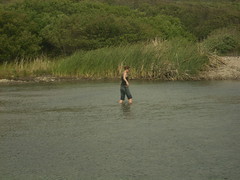Health insurance isn't for the weak of heart.
Well, technically, it is, but in our country, I get the feeling the entire industry weakens the heart.
I'm a middle-class Caucasian woman with an entire network of family, friends and medical professionals who have proven, time and time again, that they can help support me. I'm in good health for someone of my size and age, with one major flaw. I deign to have a pre-existing condition.
I've been over this before, and I have a feeling I'll be going over it every day until type 1 diabetes has a hard and fast cure. But lately I have been particularly flummoxed by privatized health care. I was reminded again this week when my family and I were contemplating options for me as I transfer grad schools and have exhausted three years of COBRA coverage. That's the word these companies use: exhaust. I don't think I've exhausted COBRA as much as it's exhausted me. And for the past four months I've been navigating this world of conversion policies and HIPAA plans, trying to find a creative way to continue coverage without draining my parents of their retirement or forcing me back to Starbucks while I get a Masters degree.
And then I came across
this article, written a mere three days after I was diagnosed as diabetic back in 2001.
Miguel Aguayo is an artist who lives in Canada, which has socialized health care--something he appreciates as a deaf man. Apparently the American privatized health care system was looking attractive to some Canadians, who grew tired of waiting in long lines, and thought that perhaps our system offered the same services more quickly. But then came the unforeseen sacrifices: Aguayo speaks of how, when he and his family lived in the U.S., they often had to postpone medical treatment until legitimate emergencies, and even then, the hospital bills were as paralyzing as the illnesses themselves.
It seems silly to have perfectly good medical facilities that are only available to those who can pay for them, and even then, to ask them to wait until they are truly risking their lives. This is not health insurance. This is disaster relief. And it's expensive.
I don't know what I hope to aim by writing this. I'm preparing to spend another week on the phone, getting transferred from department to department of a huge, profit-seeking health insurance company whose employees see me as a subscriber ID number, one with a pesky little condition that ultimately will cost them more if I keep myself healthy than if I don't have access to the tools I need to stay well.
I wonder what undocumented immigrants do? I wonder what Canadians do? I wonder what these so-called proponents of privatized health care do, when they lose their jobs, get diabetes themselves, or have an unplanned pregnancy?
I might take a cue from Aguayo and head north. As soon as I get off the phone.


